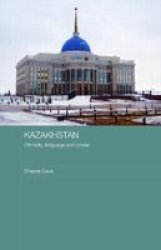Description
Kazakhstan is a country in Central Asia that is emerging as one of the most dynamic economic and political actors in the region. It is the second largest country in the former Soviet Union, after Russia, and has rich natural resources, particularly oil. Kazakhstan has an impressive record of economic growth under the leadership of President Nursultan Nazarbaev, and has ambitions to project itself as a modern, wealthy civic state, with a developed market economy. At the same time, Kazakhstan is one of the most ethnically diverse countries in the region, with very substantial non-Kazakh and non-Muslim minorities. Its political regime has used elements of political clientelism and neo-traditional practices to bolster its rule. Drawing from extensive ethnographic research, interviews, and archival materials, this book traces the development of national identity and statehood in Kazakhstan, focusing in particular on the attempts to build a national state. It argues that Russification and Sovietization were not simply 'top-down' processes, that they provide considerable scope for local initiatives, and that Soviet ethnically-based affirmative action policies have had a lasting impact on ethnic elite formation and the rise of a distinct brand of national consciousness.
Kazakhstan is emerging as the most dynamic economic and political actor in Central Asia. It is the second largest country of the former Soviet Union, after the Russian Federation, and has rich natural resources, particularly oil, which is being exploited through massive US investment. Kazakhstan has an impressive record of economic growth under the leadership of President Nursultan Nazarbaev, and has ambitions to project itself as a modern, wealthy civic state, with a developed market economy. At the same time, Kazakhstan is one of the most ethnically diverse countries in the region, with very substantial non-Kazakh and non-Muslim minorities. Its political regime has used elements of political clientelism and neo-traditional practices to bolster its rule. Drawing from extensive ethnographic research, interviews, and archival materials, this book traces the development of national identity and statehood in Kazakhstan, focusing in particular on the attempts to build a national state. It argues that Russification and Sovietization were not simply 'top-down' processes, that they provide considerable scope for local initiatives, and that Soviet ethnically-based affirmative action policies have had a lasting impact on ethnic elite formation and the rise of a distinct brand of national consciousness.
